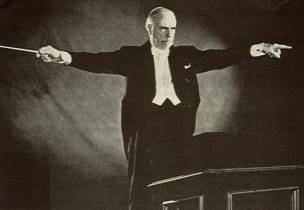
Sir Thomas Beecham (29 April 1879 – 8 March 1961) The celebrated English conductor, Thomas Beecham, was born to a father, Sir Joseph Beecham, a man of great wealth, derived from the manufacture of the once-famous Beecham pills. Thanks to them, young Beecham could engage in life's pleasures without troublesome regard for economic limitations. He had his first music lessons from a rural organist. From 1892 to 1897 he attended the Rossall School at Lancashire, and later went to Wadham College, Oxford. He did not have any formal music school. Musically he was an autodidact and taught himself everything. Later on he studied composition in London with Charles Wood and in Paris with Muszkowski. In 1899 Thomas Beecham organised, mainly for his own delectation, an amateur ensemble, the St. Helen's Orchestral Society. Also in 1899 he conducted a performance with the prestigious Hallé Orchestra in Manchester. In 1902 he became conductor of K. Trueman's travelling opera company, which gave him valuable practical experience with theater music. He led this ensemble until 1904. In 1905 he gave his first professional symphonic concert in London, with members of the Queen’s Hall Orchestra. In 1906 he became conductor of the New Symphony Orchestra, which he led until 1908. Then formed a group in his own name, the Beecham Symphony Orchestra, which presented its first concert in London in February 1909. In 1910, financially backed by his family, Thomas Beecham took over the creative and business management of Covent Garden in London. In subsequent seasons conducted there and at other London theatres. He was the first in England to perform The Mastersingers of Nüremberg by R. Wagner, Elektra and Salome by R. Strauss and thus enriched the musical life of the English capital. He invited Fyodor Shalyapin, the Ballets Russes, Wilhelm Furtwängler, Erich Kleiber, in other words everyone of repute, to give guest performances in London. In 1915, during World War I, he organised the Beecham Opera Company by which time his reputation as a forceful and charismatic conductor was securely established in England. His audiences grew; the critics, impressed by his imperious ways and his unquestioned ability to bring out spectacular operatic productions, sang his praise; however, some commentators found much to criticise in his somewhat cavalier treatment of the classics. In appreciation of his services to British music, Thomas Beecham was knighted in 1916. With the death of his father, he succeeded to the title of baronet. But all of his inherited money was not enough to pay for his exorbitant financial disbursements in his ambitious enterprises, and in 1920 his operatic enterprise went bankrupt. He rebounded a few years later and continued his extraordinary career. In January 1928, lie made his USA debut as a guest conductor of the New York Philharmonic Orchestra, at which concert Vladimir Horowitz also made his USA debut as soloist. In 1929 Thomas Beecham organised and conducted the Delius Festival in London, to which Delius himself, racked by tertiary syphilitic affliction, paralysed and blind, was brought from his residence in France to attend Beecham's musical homage to him. From 1932 to 1939 he conducted again at Covent Garden. In 1932 he organised the London Philharmonic Orchestra, which also played at Covent Garden. Contemptuous of general distaste for the Nazi regime in Germany, he took the London Philharmonic Orchestra to Berlin in 1936 for a concert, which was attended by the Führer in person. As the war situation deteriorated on the Continent, Beecham went to the USA in May 1940, and also toured Canada and Australia. In 1941 he was engaged as conductor of the Seattle Symphony Orchestra, retaining this post until 1943; he also filled guest engagements at the Metropolitan Opera in New York from 1942 to 1944. In America he was not exempt from sharp criticism, which he haughtily dismissed as philistine complaints. On his part, he was outspoken in his snobbish disdain for the cultural inferiority of England's wartime allies, often spicing his comments with mild obscenities, usually of a scatological nature. After his return to England he was no longer able to resume his work at Covent Garden; his former orchestra, the London Philharmonic Orchestra, chose self-administration and rejected Beecham as its sole manager. As a result he founded, in 1946, still another orchestra, the Royal Philharmonic Orchestra, which he managed until the end of his days. In 1950 he made an extraordinarily successful North American tour with the Royal Philharmonic Orchestra. He continued to conduct the Royal Philharmonic Orchestra until ill health led him to nominate Rudolf Kempe as his successor in 1960. In 1957 Queen Elizabeth II made him a Companion of Honour.
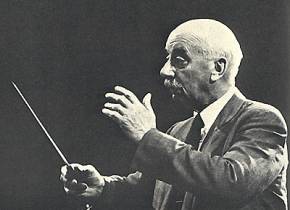
Sir Adrian Cedric Boult (8 April 1889 – 22 February 1983)
The eminent English conductor, Sir Adrian (Cedrik) Boult, studied at Westminster School and then at Christ Church, Oxford under Sir Hugh Allen. He completed his training in Leipzig under Max Reger and had the good fortune to watch Arthur Nikisch at work. Back in Britain, he gave concerts at Covent Garden. In 1919, on request from the composer Gustav Holst, he conducted the first performance of part of the suite The Planets. From 1919 to 1930 he was on the teaching staff of the Royal College of Music, London. He conducted in England and abroad, and in 1924 he took over the directorship of the Birmingham Festival Chorus and the City of Birmingham Symphonic Orchestra (until 1930). In 1926 he became the assistant musical director of Covent Garden. From 1928 to 1931 he conducted the BBC Bach Choir and from 1930 to 1950, the BBC Symphony Orchestra, a post which brought him international fame. With his orchestra, he visited Vienna (1933), Boston and Salzburg (1935) and New York (1938 and 1939). From 1942 to 1950 he was the deputy director of the London 'Proms'. In 1936 he conducted during the coronation of George VI. From 1950 he was the director of the London Philharmonic Orchestra. In 1957 he resigned this post, and after that he only worked as a guest conductor. In 1968 he conducted Edward Elgar's The dream of Gerontius for television in Canterbury Cathedral. From 1959 he again directed the City of Birmingham Symphony Orchestra. He taught at the Royal College of Music from 1962 to 1966. In 1979 he stopped conducting.
Soloists who participated in the recording of his Ninth Symphony:
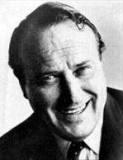 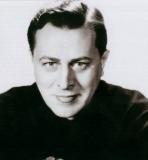
Richard Lewis Kim Borg
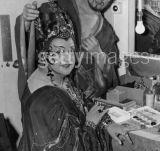 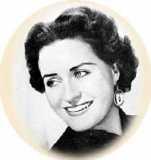
Sylvia Fisher Nan Marriman
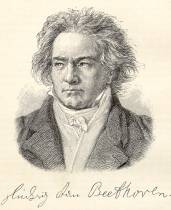
Ludwig van Beethoven
Symphony no 2 in D major, Op. 36
London Symphony Orchestra 9-10.11.1926
Symphony no 4 in B flat major, Op. 60
London Symphony Orchestra 1945
Symphony no 9 in D minor, Op. 125 Kim Borg, bass
Richard Lewis, tenor
Sylvia Fisher, soprano Nan Marriman, mezzo-soprano Edinburgh Festival Chorus Royal Philarmonic Orchestra 19.08.1956 Sir Thomas Beecham
Symphony no 3 in E flat major, Op. 55
1962
Symphony no 5 in C minor, Op. 67
1959
Coriolan Overture in C minor, Op. 62
1962
Leonore Overture no 3 in C major, Op. 72a
1962
Philharmonic Promenade Orchestra
Sir Adrian Boult
**********
Записи из собственной колекции.
| 
